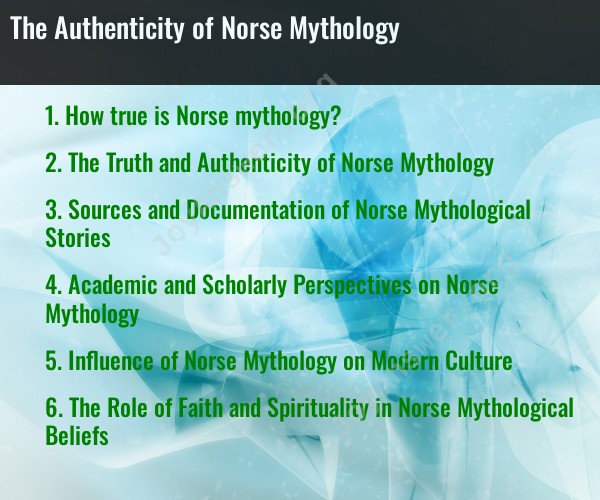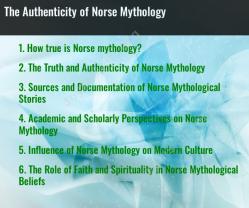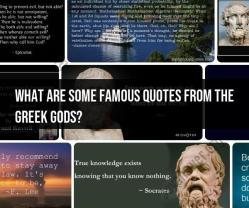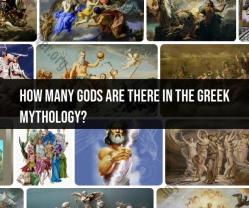How true is Norse mythology?
Norse mythology, like many ancient mythological systems, is a collection of stories, legends, and beliefs that were passed down through generations by oral tradition before being recorded in written form. The authenticity of Norse mythology, in the sense of its historical accuracy, is a complex and nuanced topic. Here are some key points to consider:
Mythological and Religious Beliefs: Norse mythology was the belief system of the Germanic peoples in the Viking Age and earlier. It was a polytheistic religion that included gods like Odin, Thor, and Freyja, as well as various supernatural creatures and realms. While these beliefs were sincerely held by the people of the time, they are considered mythological and religious in nature rather than historical or factual accounts.
Written Sources: Much of our knowledge of Norse mythology comes from medieval Icelandic texts, primarily the Eddas and the sagas. The Prose Edda, written by Snorri Sturluson in the 13th century, and the Poetic Edda, a collection of poems, are among the most important sources. These texts were written down long after the Viking Age, and the writers had their own Christian perspectives, which may have influenced how they portrayed Norse mythology.
Oral Tradition and Adaptation: Before being written down, Norse mythology was transmitted through oral tradition, which can lead to variations and adaptations over time. These oral narratives would have been influenced by the cultural and historical context of the communities that passed them on.
Symbolic and Allegorical Nature: Like many mythological systems, Norse mythology includes elements of symbolism and allegory. The stories often convey moral or philosophical lessons and reflect the worldview and values of the people who believed in them.
Historical Context: Norse mythology was an integral part of the cultural and religious landscape of the Germanic peoples during the Viking Age. It was inseparable from their understanding of the world and their place in it. While the stories themselves may not be historically accurate, they offer insights into the beliefs and values of that era.
Modern Interpretations: Norse mythology continues to be of great cultural and historical significance, and it has been adapted and reinterpreted in various ways in modern literature, art, and popular culture. Many people find meaning and inspiration in these ancient stories, even if they do not adhere to the original religious beliefs.
In summary, the authenticity of Norse mythology is more about its significance as a mythological and religious system rather than its historical accuracy. While the specific stories and characters may not be considered factual historical accounts, they remain a valuable and enduring part of human cultural heritage, offering insight into the beliefs and values of the people who practiced this mythology in the past.
The Truth and Authenticity of Norse Mythology
Norse mythology is a collection of stories and beliefs about the gods and goddesses of the Norse people. It is a complex and rich mythology, with its own unique cosmology, pantheon, and stories.
Norse mythology is not a literal record of historical events. However, it does contain elements of truth and authenticity. For example, many of the gods and goddesses in Norse mythology are based on real people and places. Additionally, Norse mythology reflects the values and beliefs of the Norse people.
Sources and Documentation of Norse Mythological Stories
The primary sources of Norse mythology are the two Icelandic Eddas, the Poetic Edda and the Prose Edda. These texts were compiled in the 13th century, but they contain stories and poems that were passed down orally for centuries before that.
In addition to the Eddas, there are a number of other sources of Norse mythology, including skaldic poetry, sagas, and runestones. These sources provide a more fragmented and incomplete picture of Norse mythology, but they help to corroborate and expand upon the information found in the Eddas.
Academic and Scholarly Perspectives on Norse Mythology
Academic and scholarly perspectives on Norse mythology have varied over time. In the early 19th century, Norse mythology was often dismissed as being primitive and savage. However, by the late 19th century, scholars began to take Norse mythology more seriously.
Today, Norse mythology is studied by a variety of scholars, including historians, anthropologists, and religious scholars. Norse mythology is seen as a valuable source of information about the Norse people and their culture.
Influence of Norse Mythology on Modern Culture
Norse mythology has had a significant influence on modern culture. Norse mythology has inspired artists, writers, and filmmakers for centuries. For example, Norse mythology was a major influence on J.R.R. Tolkien's The Lord of the Rings trilogy.
In recent years, Norse mythology has become increasingly popular in popular culture. This is due in part to the success of the Marvel Cinematic Universe films, which feature a number of Norse gods and goddesses.
The Role of Faith and Spirituality in Norse Mythological Beliefs
Norse mythology played an important role in the faith and spirituality of the Norse people. The Norse gods and goddesses were seen as powerful beings who could influence the world around them. The Norse people worshipped the gods and goddesses and prayed to them for help and guidance.
Norse mythology also contained a number of ethical and moral teachings. For example, the Norse people believed in the importance of honor, courage, and loyalty.
Conclusion
Norse mythology is a complex and rich mythology with a long and fascinating history. It has had a significant influence on modern culture and continues to be studied by scholars today.




